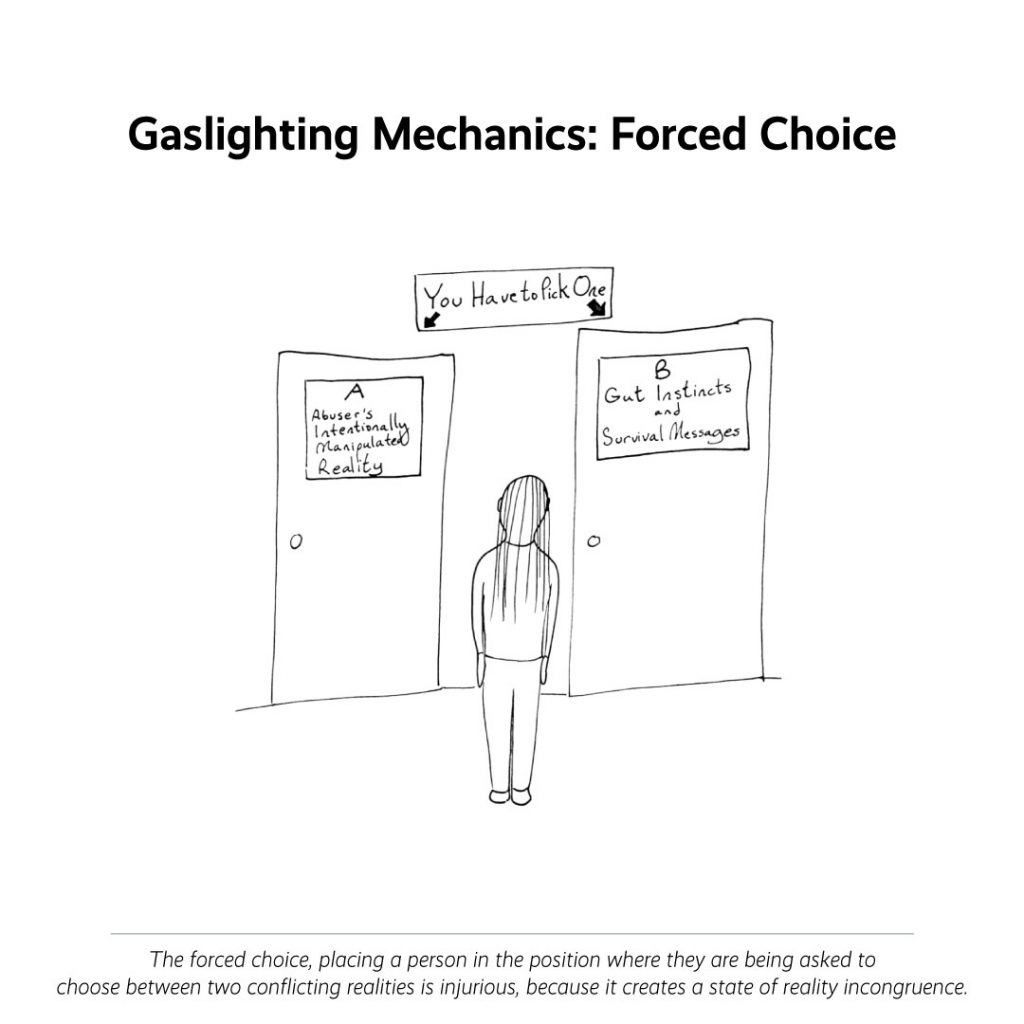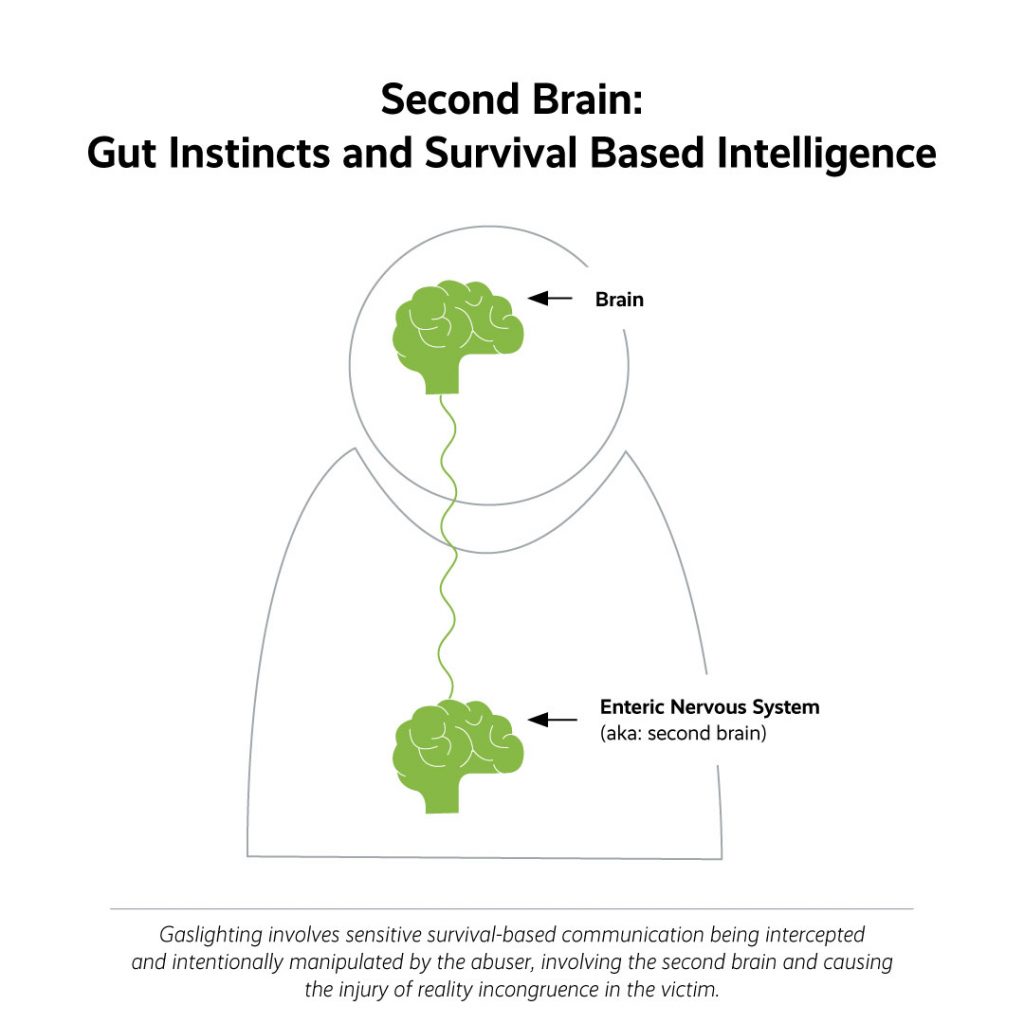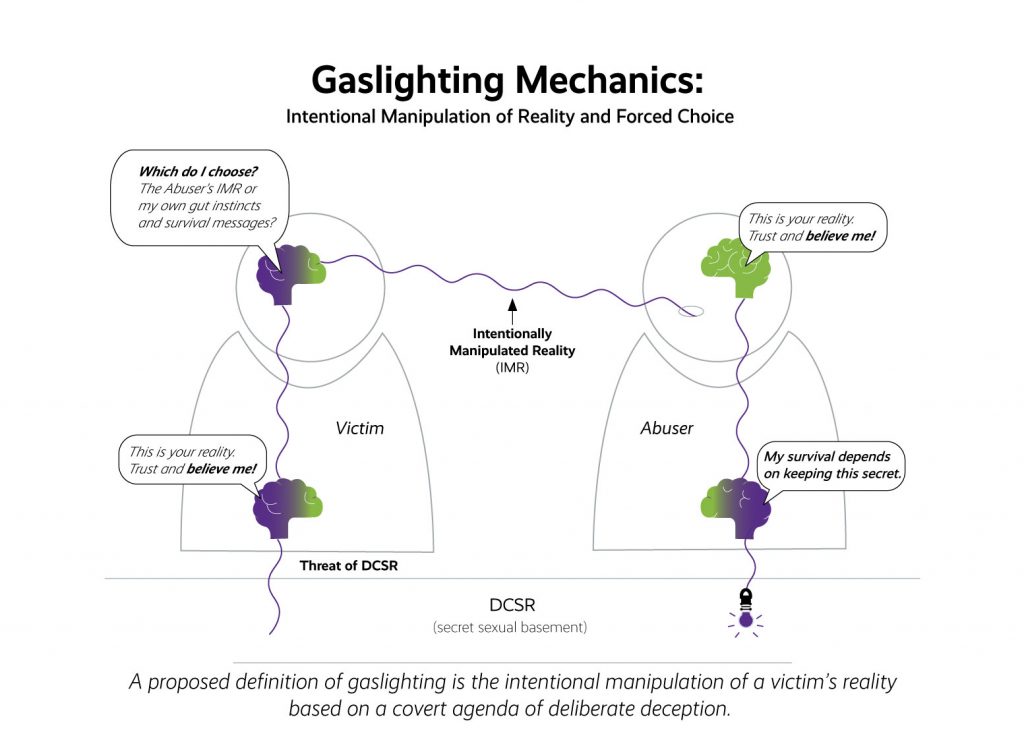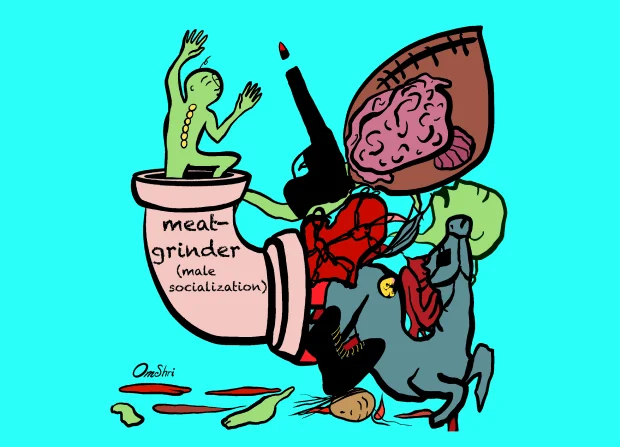Defining Gaslighting
Gaslighting is a psychological tactic used to manipulate and distort someone’s perception of reality, memory, or mental stability. According to Merriam-Webster, gaslighting involves:
- Prolonged psychological manipulation, causing the victim to question their thoughts, perception of reality, or memories. This manipulation typically leads to confusion, loss of confidence and self-esteem, emotional stability, and dependence on the perpetrator.
- Grossly misleading someone for personal advantage.
The Oxford English Dictionary describes gaslighting as using psychological methods to make someone question their sanity or reasoning abilities through persistent denial, misdirection, contradiction, and lying. Tormoen (2019) views it as a conscious or unconscious form of psychological abuse where a perpetrator distorts information to confuse a victim, causing them to doubt their memory and sanity.
Need for a Clinical Term
Despite its growing recognition, gaslighting remains a colloquialism derived from the 1944 film “Gaslight” and is not a formal clinical term. The psychological field often refers to it broadly as psychological abuse or psychological manipulation. However, this general term is inadequate given the distinct and severe nature of gaslighting. The field of psychology needs a diagnostic term for gaslighting beyond psychological manipulation, as current terminology does not capture the specific nuances of this abuse. Adopting the term gaslighting within clinical science could provide a more precise understanding and treatment framework.
Gaslighting: An Established but Understudied Form of Psychological Abuse
In the long term, psychological abuse can be more harmful than physical abuse (Anderson et al., 2003). However, research on gaslighting is limited compared to other forms of intimate partner abuse (Klein et al., 2023; Marche, 2020). Gaslighting often goes unrecognized even in domestic abuse contexts, despite its key characteristic of making victims doubt their reality (March et al., 2023).
Gaslighting Behaviors
Gaslighting behaviors include withholding information from the victim, countering information to fit the abuser’s perspective, discounting information, verbal abuse (often in the form of offensive jokes), blocking and diverting the victim’s attention from outside sources, trivializing the victim’s worth, and undermining victim by gradually weakening them and their thought processes (Petric, 2022). Gaslighting is associated with sociopathy and narcissistic personality traits (Hightower, 2017; Petric, 2022). The Diagnostic and Statistical Manual of Mental Disorders – Version V acknowledges the abuse under the diagnostic code for Partner or Spouse Abuse, Psychological, providing the example, “trying to make the victim think that he or she is going crazy” (American Psychiatric Association, p. 721, 2013), which is often referred to as “crazy-making,” a term for gaslighting. Hence, being subjected to gaslighting as an intimate partner or spouse is recognized as psychological intimate partner abuse by the DSM-V (American Psychiatric Association, 2013).
Defining Gaslighting as Intentionally Manipulated Reality (IMR)
A proposed definition of gaslighting is the intentional manipulation of a victim’s reality based on a covert agenda of deliberate deception. The Intentional Vibe Theory (IVT), developed by Minwalla (2022), introduces two key concepts: Intentionally Manipulated Reality (IMR) and Intentionally Accurate-Authentic Reality (IAR).
- IMR (Intentionally Manipulated Reality): This refers to the distorted version of reality that the abuser imposes on the victim, controlling their thoughts, feelings, and understanding of reality.
- IAR (Intentionally Accurate-Authentic Reality): The truth based on science, reason, logic, and authenticity.
According to IVT, IMR leads to psychological harm and disease, while IAR supports mental well-being and health.
Understanding Deceptive Compartmentalization
Compartmentalization involves separating specific parts from the whole. When combined with deception, it becomes problematic. Deceptive compartmentalization involves intentional dishonesty and the separation of truths from the whole, resulting in the creation of separate realities that are maintained through ongoing manipulation, omissions, and lies. For example, a deceptive compartmentalized business reality might involve secretly running a business while being employed by another company, requiring continuous deception and gaslighting. This means intentionally manipulating the perceptions/realities of the company’s associates and partners, driven by a deliberate agenda of deceit.
Deceptive, Compartmentalized Sexual-Relational Reality (DCSR)
Deceptive compartmentalization involves hiding sexual or relational realities from a primary or intimate partner. This often occurs in cases of infidelity, sex addiction, and compulsive sexual behaviors, which require gaslighting to maintain secrecy. A deceptive, compartmentalized sexual or relational reality (DCSR) refers to a secret sexual life within the context of intimate and/or family relationships, concealed from the primary partner. The metaphor of a secret sexual basement underneath the relational home is used to describe these hidden sexual realities, known as deceptive sexuality.
The key concept here is deceptive compartmentalization. Both infidelity and compulsive sexual behavior problems usually involve deceptive compartmentalization. Engaging in a sexual behavior is different than living a “double life,” which describes deceptive compartmentalization. Keeping a secret sexual truth hidden requires an ongoing system of covert operations and intentional manipulation of the victim’s reality, which is the definition of gaslighting.
Deceptive Sexuality as a Psychological Operation (PSYOP)
Gaslighting, a military tactic used in psychological warfare and psychological operations (PSYOP), aims to influence the enemy’s state of mind. PSYOP convey carefully selected information to influence the motives and objective reasoning of their target audiences, ultimately impacting their beliefs and behaviors (United States Department of the Air Force, 1999). Similarly, deceptive sexuality operates as a psychological operation designed to manipulate the victim’s state of mind and perception of reality. This is achieved by presenting selective information while withholding critical, life-altering information, thereby controlling the victim’s understanding of their reality.
The control of information in deceptive sexuality mirrors the principles of information warfare, where the victim is deprived of the ability to make autonomous, informed decisions. This is because they are denied access to the truth of their situation. Similar to military operations, deceptive sexuality uses tactics of deliberate deception, dishonesty, and intentional manipulation. These tactics disrupt the victim’s decision-making processes, undermining their control over their own reality and internal command centers.
Keeping a secret sexual truth hidden requires an ongoing system and covert operation of intentionally manipulating the victim’s reality, the definition of gaslighting.
Gaslighting Mechanics: Active, Passive, Behavioral, and Systemic
Gaslighting, defined here as the intentional manipulation of a victim’s reality based on a covert agenda of deliberate deception, operates through several mechanisms:
- Passive Gaslighting: The victim subconsciously detects threats, leading to confusion and manipulation without overt actions by the abuser.
- Active Gaslighting: Direct, overt manipulation of reality through lying, deflecting, and other deceitful tactics.
- Behavioral Gaslighting: Specific acts of active gaslighting, seen as abusive and harmful actions, used to sustain the agenda of deliberate deception.
- Systemic Gaslighting: Ongoing subjection to a system of gaslighting based on deliberate deception, rather than isolated incidents.
In the covert phase of deceptive sexuality, before discovery, the partner or entire family is subjected to an Intentionally Manipulated Reality the entire time that the compartment exists. This makes deceptive sexuality inherently systemic gaslighting. Before and after discovery or disclosure, the abuser may also subject the victim(s) to active gaslighting, often to defend against the truth. Each act of active gaslighting is harmful, and repeated patterns of such behavior constitute a form of complex trauma shaping (Minwalla, 2021).
Gaslighting is often used when the abuser is confronted with the truth, using tactics to avoid responsibility. These tactics include victim-blaming, technical manipulation, deflection, minimizing, defying logic or reason, diminishing victim credibility, lying by omission, twisting facts, and ignoring facts – collectively termed integrity-abuse behaviors (Minwalla, 2021).
A deceptive, compartmentalized sexual or relational reality – having a secret sexual life within intimate and/or family relationships – involves systemic and passive gaslighting simply by maintaining the secret basement. Active gaslighting behaviors are then used as needed to sustain the agenda of deliberate deception to withhold life altering information.
In this way, infidelity or deceptive sexuality is a form of gaslighting, a form of psychological abuse. The word abuse here refers not to the sexual behavior itself, but to the system and behaviors that sustain the hidden secret. This constitutes both systemic and behavioral gaslighting and is a specific type of psychological and intimate partner abuse.
An Educational Metaphor: The Two Doors of Forced Choice
To help conceptualize a harmful aspect of gaslighting, consider the metaphor of “The Two Doors of Forced Choice”. Victims of gaslighting often face a forced choice between believing the abuser’s manipulated reality (Door A) or trusting their own instincts (Door B). This forced choice erodes their belief in either the abuser’s reality or their own perceptions, meeting the definition of gaslighting and coercive control (Candela, 2016).
Placing someone in a position where must choose between two conflicting realities is injurious because it creates a state of reality incongruence. For optimal stability and functioning as human beings, we need a consistent sense of reality. When forced to choose, we must either believe our intimate partner (the abuser) or trust our own gut instincts, second brain, and other neurological systems that detect truth through cues such as the human voice and eye. This information is critical for protection and survival.

Gaslighting Mechanics: Forced Choice
Forced choice is a harmful and injurious position in which the abuser places the victim into a psychological and neurological forced-choice position: either believe the abuser’s manipulated reality (Door A) or rely on their own psyche’s detection system, including the second brain and enteric system, as well as all other sources of data (Door B). Whichever door the victim chooses, the other is harmed and negatively impacted in terms of belief, reliance, trust, use, and utility. If the victim chooses the abuser’s intentionally manipulated reality (Door A), they are choosing to not trust or believe in their own sense of reality (i.e., their “gut instincts”). Conversely, if the victim chooses to trust their own perceptions (Door B), then they must reject the reality being imposed by the abuser.
Ongoing incidents of forced choice over time will erode either source – belief in the abuser’s reality or reliance on the victim’s own sense of reality, including their enteric system and other neurological detection systems. This dynamic meets the definition of coercive control, which emphasizes the core of most domestic abuse: the abuser’s need for power and control over another person. Coercive control also incorporates numerous types of nonphysical domestic abuse patterns (Candela, 2016).
The forced choice that victims of gaslighting face erodes either belief in the abuser’s manipulated reality or trusting their own perceptions, thus meeting the definition of gaslighting and coercive control (Candela, 2016; Smith, 2003).
Second Brain Injury: Erosion of Enteric System
Once dismissed as a simple collection of relay ganglia, the enteric nervous system is now recognized as a complex, integrative brain in its own right (Gershon, 1999), often referred to in neuroscience as the “second brain.” It is probably not a coincidence that we say in English: “I felt it in my gut” or “I had a gut instinct.” The second brain and the enteric nervous system in the gut are known to detect and communicate with our primary brain and is associated with overall health (Mayer, 2011).

Gaslighting forces victims to choose between trusting their partner or their own gut instincts and detection systems. If the victim chooses to trust their partner, they ignore their own gut instincts. During the covert phase, victims might subconsciously sense the presence of deceit, even without being fully aware of it. This subconscious detection leads to confusion and gradually erodes the victim’s trust in their own gut instincts over time.
By trusting their partner’s manipulated reality, victims learn to distrust and ignore their healthy survival instincts (Smith, 2003). Over time, this process can severely damage their relationship with and reliance on their natural detection and survival signals. This erosion can have long-term effects on their psychological and physical well-being, making them less attuned to their own needs and instincts. It can lead to a profound loss of self-trust, altering their sense of the self as reliable knowers (Hailes & Goodman, 2023).
Erosion of Relational Integrity and Attachment
When the victim chooses to trust their own instincts instead of their partner’s manipulated reality, they inevitably lose trust in their partner’s voice and version of reality. This impacts their ability to form secure attachments and the ability to depend on the stabilizing function of healthy dependency. This loss of trust may erode the safety net provided by attachment security and stable relationships, causing psychological instability (Smith, 2003). Over time, this can erode their relationship with their partner, undermining basic trust and attachment security, and making it difficult to rely on their partner’s perspective.

Case Vignette: Illustrating Trust, Instinct, and Reality in Deceptive Relationships
Rebecca, a 35-year-old woman, felt a growing sense of unease regarding her husband Mark’s behavior. One evening, when Mark arrived home later than usual, she felt something was off. Trusting her instincts, she asked him, “Where were you?” Mark responded calmly, claiming he had stopped by his grandmother’s house to check on her. In reality, Mark had visited a massage parlor, where he engaged in sexual activity before rushing home and taking a quick shower.
As they sat down for dinner with their three children, their young daughter innocently asked, “How was your day, Dad, and why are you out of breath?” Mark deflected the question by saying, “My day was fine, honey. How was your day at school?” This response is a clear example of active gaslighting, where Mark intentionally manipulated reality (IMR) to create a false narrative, deceiving Rebecca and their children.
In this situation, Rebecca faces a forced choice between accepting her husband’s version of events and trusting her own instincts. Mark’s “cover story” about visiting his grandmother is a deliberate attempt to manipulate Rebecca’s perception of reality. His calm demeanor and quick response are designed to suppress her suspicions and convince her that his actions are innocent.
Rebecca’s gut reaction, however, signals that something is wrong. This internal conflict between believing her husband’s narrative and trusting her instincts is a classic example of gaslighting. Mark’s behavior erodes Rebecca’s ability to trust her own perceptions, creating a sense of confusion and self-doubt (Smith, 2003). This dynamic erodes her confidence in her instincts, making her more vulnerable to further manipulation.
Over time, the repeated experience of forced choices can erode Rebecca’s trust in her own instincts. Consistently choosing to believe Mark’s manipulated reality over her gut feelings may lead to a progressive disconnection from her internal warning systems. This phenomenon is akin to the “frog in boiling water” metaphor, where the gradual increase in temperature goes unnoticed.
Rebecca’s forced choice between trusting her husband or her own instincts also has profound implications for their relationship. Trust is a fundamental component of attachment and security in intimate partnerships. When trust is undermined by gaslighting, it damages the relational foundation, leading to emotional harm and potentially the breakdown of the relationship.
This case exemplifies the insidious nature of gaslighting and its detrimental effects on the victim’s psychological well-being and relational dynamics. Rebecca’s struggle between trusting her instincts and accepting her husband’s manipulated reality highlights the profound impact of gaslighting on one’s sense of reality and self-trust. Understanding these dynamics is crucial for clinicians working with individuals in similar situations, as it underscores the importance of validating the victim’s experiences and helping them reconnect with their internal sense of reality.
Gaslighting and Gender Inequality
Gaslighting is deeply rooted in social inequalities, including gender inequality, and often occurs in power-laden relationships. Perpetrators exploit gender-based stereotypes and institutional inequalities to manipulate victims, frequently associating femininity with irrationality (Sweet, 2019). In the context of infidelity and deceptive sexuality, male abusers often use gender stereotypes to justify their behavior and facilitate gaslighting, which is further reinforced by societal and institutional biases (Sweet, 2019).
Men who engage in affairs and even male therapists can leverage stereotypes about women in therapy, thereby perpetuating these harmful dynamics (Gass & Nichols, 1988). Survivors of deceptive sexuality frequently do not receive recognition as victims of abuse across various societal strata, including friends and family; therapy and treatment professionals; the media, legal, police, medical systems, leading to multi-level betrayal trauma (Gómez & Freyd, 2019). Stark (2019) offers the term manipulative gaslighting to describe the intentional effort to undermine women by denying their testimony about harms done to them by men. Stark argues that manipulative gaslighting is a method of enacting misogyny and is often a collective phenomenon, qualifying as a mode of psychological oppression.
Gaslighting is also a form of gender-based violence that often remains hidden, partly due to patriarchal norms and male sexual entitlement. The notion of a secret sexual basement exemplifies male structural power and privilege. The blueprint for building a secret sexual basement is passed down from one generation of men to the next. Having a secret sexual basement is one way of gaining a one-up position of dominance and control and reinforces masculinity within a patriarchal culture that offers men a “hall pass” when it comes to sexual or relational dishonesty.
Despite these dynamics, research suggests that therapists often fail to acknowledge the relevance of gender in cases of sexual acting out and do not address gender issues directly when treating couples experiencing infidelity (Williams & Knudson-Martin, 2013). This oversight highlights the need for a more nuanced understanding of how gender and power dynamics influence the perpetration and impact of gaslighting in intimate relationships.
Physical, Somatic, and Medical Symptoms
Victims of gaslighting may experience unexplained medical symptoms that align with the abuser’s deceptive sexual and relational behaviors. The timelines of these symptoms often align with the periods of deceptive activities (Minwalla, 2022). One hypothesis suggests that when there is a progressive lack of healthy response to second brain communication (the gut-brain axis), the body may find alternative methods of communication, including somatic symptoms and physical manifestations.
These medical symptoms frequently defy easy or complete explanation by medical professionals (Minwalla, 2022). This suggests a potential connection between psychological manipulation and physical health impacts, highlighting the need for further research into the intricate relationship between psychological abuse and somatic symptoms. Such insights could improve understanding and treatment of the complex health issues faced by victims of gaslighting.
Intentionally Manipulated Reality (IMR) promotes disease and Intentionally Accurate-Authentic Reality (IAR) promotes health.
Dependency, Vulnerability, and the Power/Authority of the Perpetrator
Betrayal trauma theory posits that the power imbalance between the perpetrator and the victim increases the victim’s vulnerability and unawareness of the abuse. This concept includes “betrayal blindness,” which refers to the victim’s unawareness of betrayal to preserve important relationships and social systems (Freyd, 1996, 1997). Such dynamics can significantly influence a victim’s decision-making processes and strategies for survival.
The power differential allows the perpetrator to manipulate and control the victim more effectively, leading to a deeper entanglement in the abusive relationship. This manipulation can impact the victim’s ability to recognize and respond to abuse, often compelling them to make forced choices that prioritize maintaining the relationship over their own well-being. Understanding these dynamics is crucial for developing effective support and intervention strategies for victims of betrayal trauma.
Summary
Gaslighting is a distinct and harmful form of psychological abuse that requires specific recognition and terminology in clinical practice. It is often present in cases of deceptive sexuality, which includes infidelity, sex addiction, and compulsive sexual behavior, where there is a hidden, compartmentalized sexual or relational reality. Understanding the mechanics of gaslighting, its gendered context, and its impacts is crucial for improving diagnosis, treatment, and support for both victims and abusers. Additionally, this understanding can help society progress towards greater gender equity.










